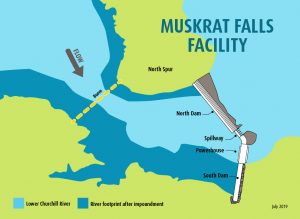Inuit leader in Atlantic Canada calls on premier to stop Muskrat Falls flooding

The president of Nunatsiavut, the Inuit region of the Atlantic Canadian province of Newfoundland and Labrador, is calling on the provincial premier to halt flooding of the Muskrat Falls reservoir, saying the risk of contamination to the ecosystem is too great.
“Our concerns over methylmercury contamination are real and must be addressed before the reservoir is flooded,” said Johannes Lampe in a news release on Monday.
“The Premier and the Government of Newfoundland and Labrador have done very little to ease our concerns over the potential impacts of Muskrat Falls on our health, culture and way of life.”
The Nunatsiavut Government said it is calling on Newfoundland and Labrador Premier Dwight Ball to tell Nalcor Energy, the company behind the Muskrat Falls project, to suspend their plans, scheduled for the first week of August, until mitigation measures are taken to ensure the Lake Melville ecosystem, located in central Labrador, is not negatively impacted.

Project mired in controversy
The Muskrat Falls hydroelectric project, pitched as green energy solution that would connect to the North American energy grid, has long been shrouded in controversy.
Its construction has gone over time and over budget. Indigenous peoples across Labrador have been protesting the project for years for its potential to negatively affect the environment and the fish and wildlife they rely on for food.
A public inquiry into the troubled project is currently underway in the province, with a final report expected by the end of the year.
“We are extremely disappointed with how the Premier has handled the whole Muskrat Falls fiasco,” Lampe said.
“He has repeatedly betrayed our trust by refusing to address our concerns, opting instead to place the health, culture and way of life of Labrador Inuit at risk. In the spirit of reconciliation, we call on the Premier to do the right thing and direct Nalcor not to flood the reservoir until the concerns of Labrador Inuit are meaningfully addressed.”
Concerns over impact on traditional foods
Methylmercury is a compound that can be created when mercury is converted into an organic form.
This form can then be easily ingested by fish and other living organisms.
In flooded areas, the water accelerates the breakdown of vegetation and speeds up the conversation of naturally occurring mercury in the soil into methylmercury. Excess consumption of food with high levels of the compound can be a risk to human health.
Many Inuit in Nunatsiavut still rely on fishing and hunting to feed their families.

Nalcor Energy, the company behind the project, announced on their website on July 17, that the reservoir impoundment was scheduled to start on August 7.
The office of Newfoundland and Labrador Premier Dwight Ball did not respond to a question regarding whether Premier Ball had been in contact with Nalcor Energy since Lampe’s comments. But in a news release on Tuesday announcing an agreement on social and health benefits with the Innu Nation and NunatuKavut Community Council (NCC) in the province, the government addressed concerns around methylmercury at Muskrat Falls.
It cited the four recommendations made by The Independent Experts Advisory Committee IEAC, a body set up in 2017 to look at mitigation and monitoring of the Muskrat Falls project, with a focus on methylmercury.
“Three achieved consensus agreement among the stakeholders, but the IEAC was not able to achieve consensus with the fourth, regarding the targeted soil removal and wetland capping,” the news release said.
“The discussion with the Innu Nation, NCC and (the Nunatsiavut Government) focused on ways to improve communities with the $30 million originally intended for wetland capping. These funds will directly benefit their communities and will enhance the lives of residents in Labrador.
“Government agrees with the Indigenous groups on the importance of continued monitoring of methylmercury levels at the Muskrat Falls reservoir, downstream and in Lake Melville.”
In their news release on Monday, the Nunatsiavut Government said Nalcor Energy had funds to cap wetlands at Muskrat Falls to reduce methylmercury but did not get necessary environmental approval from the Government of Newfoundland and Labrador.
“We were informed that the application was not processed, yet we have not received any reason as to why,” Lampe said. “Now we are being told, by both the Premier and Nalcor CEO Stan Marshall, that it is too late to carry out any mitigation measures; that flooding is eminent.”
Nalcor Energy did not respond to request for comment on this story.
Write to Eilís Quinn at eilis.quinn(at)cbc.ca
Related stories from around the North:
Canada: Community in northern Quebec to make the jump from diesel to hydroelectricity, CBC News
Finland: The world could transition entirely to cheap, safe renewable energy before 2050: Finnish study, Yle News
Norway: The quest to turn Norway’s Arctic coast into Northern Europe’s wind power hub, The Independent Barents Observer
Russia: Italian firm to build giant wind farm in northwestern Russia, The Independent Barents Observer
Sweden: Sweden’s solar industry sees bright future despite shrinking subsidies, Radio Sweden
United States: Despite winter darkness, solar power might work better in rural Alaska than you’d expect, Alaska Dispatch New



